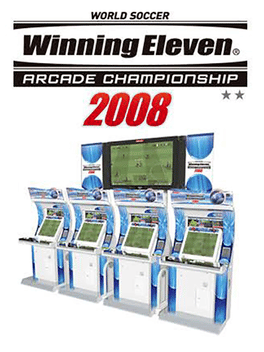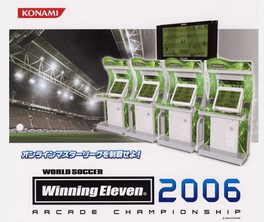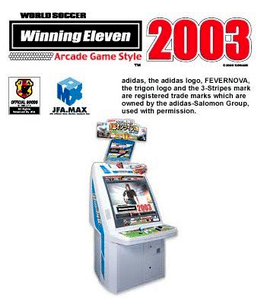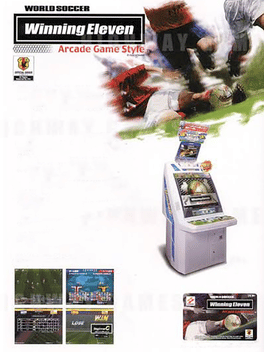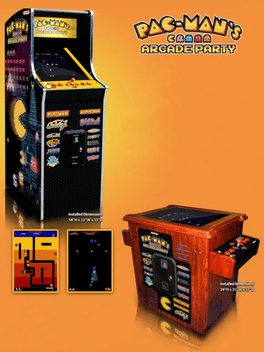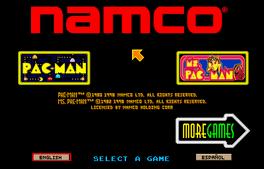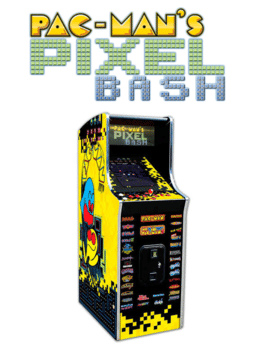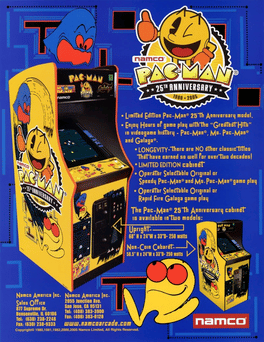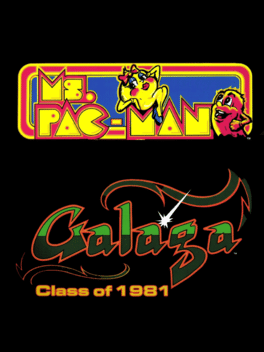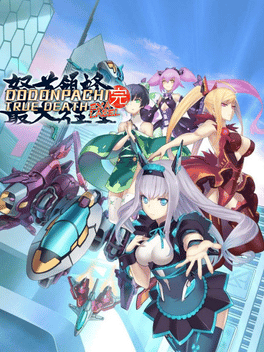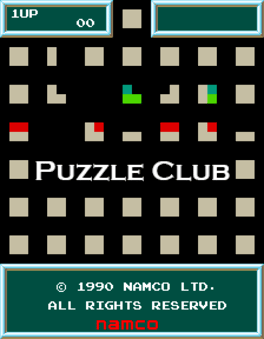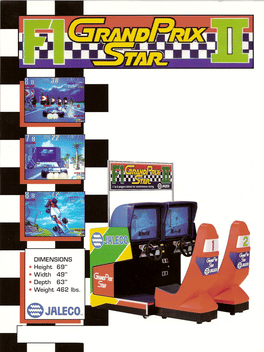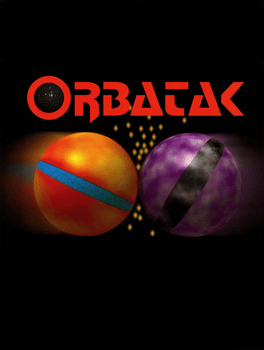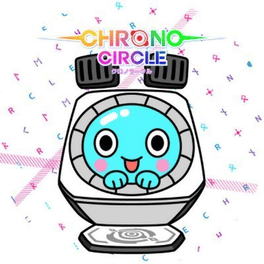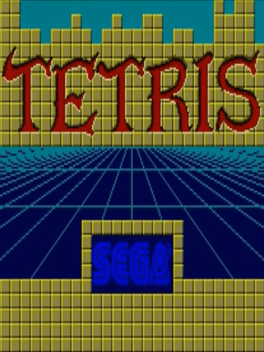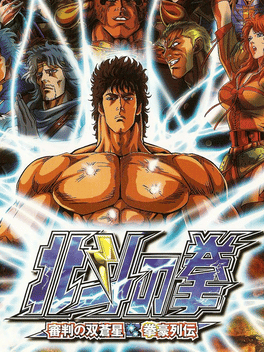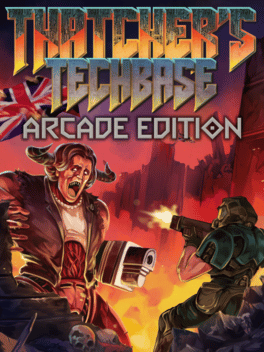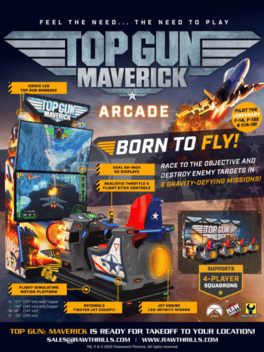Most Popular Arcade Games - Page 43
-
World Soccer Winning Eleven 2006 Arcade Championship
Winning Eleven 2006 Arcade Championship is an arcade version of Konami's long-running 3D soccer series. -
Pac-Man's Arcade Party
2010
Includes Galaxian, Pac-Man, Rally-X, Galaga, Bosconian, Dig Dug, Xevious, Mappy, Pac-Mania, Galaga '88, Dragon Spirit and Rolling Thunder. A home version was released that included Ms. Pac-Man. -
Galaxy Games StarPak 2
1998
Galaxy Games StarPak 2 is an arcade game released in 1998 by Creative Electronics & Software. It is a multigame conversion kit for Galaxy Games-branded arcade machines, adding additional games. It features unique versions of Pac-Man and Ms. Pac-Man not found elsewhere, which feature two-player cooperative modes. The games are controlled using a trackball. -
Pac-Man's Pixel Bash
2018
Pac-Man's Pixel Bash
2018
Released in 2018 by Bandai Namco, just ahead of Pac-Man's 40th anniversary. Features 31 games. -
Pac-Man 25th Anniversary
2004
Released in 2004 by Namco. Nearly identical to Ms. Pac-Man/Galaga, except Pac-Man is unlocked by default. -
Ms. Pac-Man/Galaga: Class of 1981
2000
Released in 2000 by Namco. This machine features both Ms. Pac-Man and Galaga, both of which were developed in 1981 (although Ms. Pac-Man was actually released in 1982). The original Pac-Man is also an unlockable game, playable by entering a joystick combination. To date, this is one of the most commonly found arcade machines in all of North America. -
Dodonpachi True Death exA Label
2020
Dodonpachi True Death exA Label is an expanded arcade-exclusive rerelease of Dodonpachi Saidaioujou. It features the original arcade and arrange modes from the Xbox 360 version, with their HD graphics display, alongside a brand-new "exA Label" mode. This new mode features rebalanced gameplay and heightened risk/reward via a reworked hyper shot system. -
Puzzle Club
Puzzle Club is a cancelled puzzle arcade game developed by Namco in 1990. While it never has received any form of official release, the game's prototype ROM was dumped and is playable in emulators. The game is very akin to slide puzzles, however the player must link the matching tiles into a horizontal row, as opposed to completing an image. Once a row has been completed, the blocks will turn to bricks, and cannot be moved. Two modes are present in the game - "Pacman Story" and "Floor Exercise" - with Pac-Man only appearing in the former. Pacman Story features the Pac-Land incarnations of various characters, fully animated, as the tilepieces. Upon completing a level it shows an intermission, featuring a zoomed-in Pac-Man character that is identical to the regular tile(s). After thirty levels, the game ends, displaying the credits. The Floor Exercise mode is incomplete and impossible to finish; instead of Pac-Man tiles, it features generic slot machine graphics. In place of Pacman Story's intermissions, Floor Exer -
Orbatak
1994
-
Dragon's Heaven
Dragon's Heaven is an incomplete and cancelled fighting game for the Neo-Geo. The game was being developed by Kengo Asai, who had previously worked on Voltage Fighter Gowcaizer and The Last Blade. -
Chrono Circle
2021
-
Tetris
1989
-
Miss Bingo
1994
Miss Bingo
1994
Miss Bingo is a clone of Min's previous game "Miss Puzzle" with updated graphics and a split screen for optional two player play. The player must slide three or more matching tiles together in horizontal, vertical, or diagonal chains to clear them from the screen. When tiles are removed from the screen surrounding tiles drop and slide around to fill the gaps. Additional tiles are added to the screen over time and The objective is to clear a set number of chains before the tiles stack up and reach the dead line at the top of the play area. Once the set number of tiles are removed, the play area is cleared and the photographic nude background image is revealed. Clearing tiles advances a bar at the bottom of the screen. Once the bar is filled the game is interrupted by a bonus game. Once the bonus game is completed the game returns to the exact spot where it had left off. If any tiles cross the dead line then the game is over. Upon continuing, the game removes the bottom few rows of tiles from the board so that ga -
Fist of the North Star
2005
The famous Anime series is now the latest arcade game from Sega! Players can choose their favorite characters from the series including Kenshiro, Raoh, Toki, Shin, Rei, Juda, Thouther, Mr. Heart and Mamiya! Fist of the North Star is a 1 or 2 player game with continuous buy-in. A Boost Gauge for offensive attacks, an Aura Gauge for defensive maneuvers, and a North Star Gauge (your 7 stars of life force) have been included to enhance game play. Don't lose your stars or the Star of Death will shine, making you dangerously vulnerable to enemy attacks! -
Thatcher's Techbase: Arcade Edition
2022
An arcade version of Thatcher's Techbase created for the Living Rent organisation, debuting at Liverpool's The World Transformed Festival in 2022. This new version of Thatcher's Techbase runs on arcade hardware and has redesigned gameplay, along with a new storyline, fast-paced maps and a scoring system. -
Top Gun: Maverick
2022
